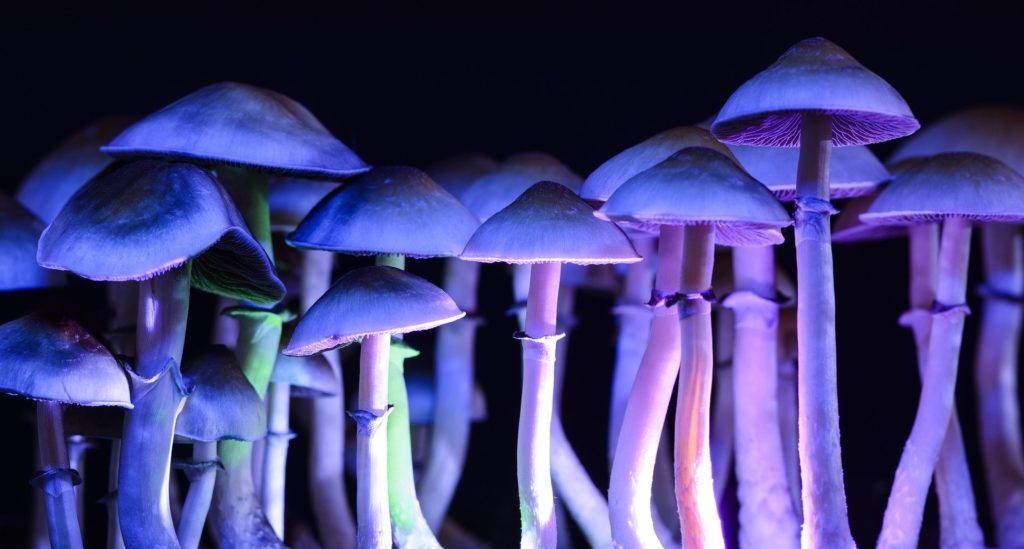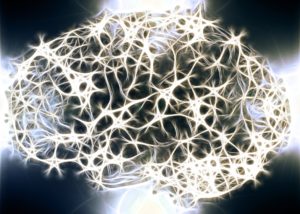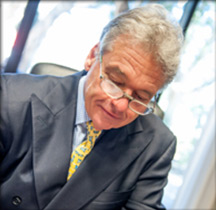
History
Psilocybin is a chemical found in a family of mushrooms commonly known as “magic mushrooms.” These mushrooms have been used throughout history to induce hallucinations. Psilocybin is a naturally occurring chemical or psychedelic compound produced by more than 150 species of mushrooms.
The genus Psilocybe has been widely studied and makes the most potent psilocybin, but psilocybin has also found in a dozen other kinds of mushrooms. Psilocybin is a prodrug quickly converted by the body to psilocin, a psychedelic chemical similar in some ways to LSD, mescaline, and DMT.
Images found on prehistoric murals and rock paintings in Spain and Algeria suggests to some experts that human usage of psilocybin mushrooms is long-standing and predates recorded history. Andy Letcher [1], in his general audience book “Shrooms,” disputes most of the prehistory.
He disagrees that mushrooms were used widely in prehistory. Lechter also argues against the idea that the true origins of religion lay in an early mushroom cult and that Jesus ate not bread and wine but fly-agaric at the Last Supper. He also disputes that the mystical raptures reported at the ancient Greek celebrations at Eleusis were shroom-fests.
“There is not a single instance of a magic mushroom being preserved in the archaeological record anywhere,” he writes [2]. “We do not know, one way or the other, whether the ancients worshipped the holy spores of God,” Letcher ( Andy Letcher’s “Shrooms: A Cultural History of the Magic Mushroom) continues. “If they did, they left not a single piece of evidence of having done so.”
More interesting are the accounts of Gordon Wasson, a vice president of J. P. Morgan. Wasson’s real-life hobby and obsession were mushrooms. He wrote extensively about mushrooms and his experiences with them.
Wasson traveled to Oaxaca, Mexico, in the 1950s, where he met MarÃa Sabina, a Mazatec Indian, who introduced him to magic mushrooms. Wasson felt “as if his soul had been scooped out of his body.”
Wasson wrote an article in 1957 for Life magazine entitled “Seeking the Magic Mushroom [3].” Experts have concluded that this Life article inspired Timothy Leary to experiment with psychedelics. Even the Time/Life founder Henry Luce took psychedelics with Wasson.
Albert Hofmann [4], a chemist at Sandoz Laboratories, identified and synthesized the psychoactive compounds psilocybin and psilocin found in psilocybe mushrooms. Sandoz marketed psilocybin as Indocybin for basic psychopharmacological and therapeutic clinical research. Sandoz manufactured and sold pure psilocybin to physicians and clinicians worldwide for use in psychedelic psychotherapy.
Psilocybin increased in popularity during the 1960s and was classed as a Schedule I drug in 1970. Some small studies with psilocybin have shown promise to treat obsessive-compulsive disorder, alcohol addiction, tobacco addiction, major depressive disorder, and the treatment of depression in terminally ill cancer patients.
More recently, the Johns Hopkins group led by Rolland Griffiths has done a well-designed and controlled trial of psilocybin in treatment-resistant depression, which has received a well-deserved and enthusiastic response from academics and the public. Psilocybin is building on the clinical research trials and the FDA approach utilized by ketamine and has become ground-breaking by itself and in the context of the future of Psychedelic Medicine [5].
Psilocybin Effects
Psilocybin is a naturally occurring tryptamine known for its psychedelic properties. Recent Johns Hopkins-led research indicates that psilocybin may constitute a valid approach to treat depression and anxiety associated with life-threatening diseases.
The intensity and duration of the effects of psilocybin depend on the dosage, individual physiology, and setting. Psilocybin is a prodrug, rapidly metabolized to psilocin, which then acts on serotonin receptors in the brain.
By targeting Serotonin (5-Hydroxytryptamine, 5-HT) receptors, psilocybin can alter perception, mood, and attention. The pharmacological challenge with the 5-HT(2A) agonist psilocybin produces a dose-dependent and reliable effect on cognition and consciousness [6].
The CNS and perception-altering effects of psilocybin typically last from two to six hours in a laboratory. But, Psilocybin users usually say that they are under the influence for a very long period since the drug can distort time perception [7].
Psilocybin is not self-administered by lab animals and reported low toxicity and a low harm potential when ingested. Nutt and his Group in the U.K. studied the safety and efficacy of psilocybin for treatment-resistant depression. While this study itself was limited, it did motivate further trials, with more rigorous designs, to examine the therapeutic potential of psilocybin better [8].
Major Depressive Disorder (MDD) – Treatment-Resistant Depression
 Psilocybin, like ketamine and other novel treatments, has been focused on the treatment of Major Depressive Disorder (MDD). MDD is a major, crucial global health problem. MDD reduces the quality of life, causes disability, and affects more than 300 million individuals worldwide.
Psilocybin, like ketamine and other novel treatments, has been focused on the treatment of Major Depressive Disorder (MDD). MDD is a major, crucial global health problem. MDD reduces the quality of life, causes disability, and affects more than 300 million individuals worldwide.
In the United States, approximately 10% of the adult population has been diagnosed with MDD in the past 12 months, and the yearly economic burden of MDD is estimated to be > $200 billion. Antidepressant pharmacotherapies for depression are available and widely prescribed. SSRI medications are safe and effective.
However, A.D.s have adverse effects, a variable response rate and have adherence problems. Although many patients with depression showed reduced or remitted symptoms after treatment with existing pharmacotherapies, up to 50% of patients do not respond to their satisfaction. Many are defined as treatment-resistant.
Until the approval of ketamine, most pharmacotherapies for MDD, including the widely used selective serotonin reuptake inhibitors, increased brain monoamine neurotransmitters -serotonin and norepinephrine (typically by blocking reuptake). Ketamine hydrochloride, a nonselective N-methyl-d-aspartate receptor antagonist, is the most well-researched of these newer medications.
Several studies have demonstrated the efficacy of a single ketamine infusion rapidly (within hours), reducing depression symptoms and, when effective, lasting from a few days to about two weeks. Ketamine was approved by the FDA, as esketamine, because of safety and efficacy and evidence suggesting that treatment of depression might be immediate with newer ketamine-like medications. Ketamine appears to exert its remarkable therapeutic efficacy in MDD through glutamate neurotransmission effects.
Psychedelic Medicines for MDD
Current drug treatments for depression have limited efficacy and are associated with adverse side effects, leading patients to stop taking them, the researchers continued. Most of the drugs currently used—including selective serotonin reuptake inhibitors (SSRIs)—increase brain neurotransmitters serotonin and norepinephrine levels.
More recently, increasing evidence has suggested that newer, ketamine-like drugs have therapeutic efficacy in MDD through their glutamate neurotransmission effects. With ketamine’s successes, psychedelic drugs have been making a comeback [9].
Scientists are rediscovering therapeutic potential for depression, anxiety, PTSD, and even SUDs. The public interest has accelerated, and new researchers and investors have emerged. Academia has followed with the Johns Hopkins University—the U.S.’s oldest research university—announcing a dedicated center for psychedelic studies [10].
In a small MDD study, Johns Hopkins [11] researchers found that supportive psychotherapy plus two doses of the psychedelic substance psilocybin caused significant reductions in depressive symptoms. While not useful in everyone, most participants improved and half of the study participants achieving remission through the four-week follow-up [12].
The Johns Hopkins Medicine researchers reported a few years earlier that psychologically supported treatment with psilocybin relieved existential anxiety and also depression in people with a life-threatening cancer diagnosis [13]. Their new study, published November 4 in JAMA Psychiatry, shows that psilocybin may be useful in the much broader population of patients who suffer from major depression.
For the new study, the researchers recruited 24 people with a long-term MDD, most of whom experienced persisting symptoms for approximately two years before enrolling in the clinical trial. Thirteen participants received the psilocybin treatment immediately after recruitment and after preparation sessions, and 11 participants received the same preparation and treatment after an eight-week delay.
For the entire group of 24 participants, 67% showed a more than 50% reduction in depression symptoms at the one-week follow-up and 71% at the four-week follow-up. At enrollment, participants had an average depression scale rating of 23, but one week and four weeks after treatment, they had an average depression scale score of 8.
Overall, psilocybin induced remissions, and at four weeks post-treatment, 54% of participants were were no longer qualified as depressed. After treatment, most participants showed a substantial decrease in their symptoms, and almost half were in remission from depression at the follow-up [14].
Participants in the delayed group didn’t show reductions in their symptoms before receiving the psilocybin treatment. The published findings cover only a four-week follow-up in 24 participants, all of whom underwent two five-hour psilocybin sessions under the researchers’ direction.
“The magnitude of the effect we saw was about four times larger than what clinical trials have shown for traditional antidepressants on the market,” says Alan Davis, Ph.D., adjunct assistant professor of psychiatry and behavioral sciences at the Johns Hopkins University School of Medicine. “Because most other depression treatments take weeks or months to work and may have undesirable effects, this could be a game-changer if these findings hold up in future ‘gold-standard’ placebo-controlled clinical trials.”
“Because there are several types of major depressive disorders that may result in variation in how people respond to treatment, I was surprised that most of our study participants found the psilocybin treatment to be effective,” said Roland Griffiths, Ph.D., the Oliver Lee McCabe III Professor in the Neuropsychopharmacology of Consciousness at the Johns Hopkins University School of Medicine, and director of the Johns Hopkins Center for Psychedelic and Consciousness Research.
Griffiths, whose research with psilocybin started in the early 2000s, suggested that the major depression treated in the new study may have been different when compared with the “reactive” form of depression in patients they studied in a 2016 cancer trial. He further noted that his team was encouraged by public health officials to explore psilocybin’s effects in the broader population of those with major depressive disorder because of the much larger potential public health impact.
“This randomized clinical trial documented the substantial rapid and enduring antidepressant effects of psilocybin-assisted therapy among patients with MDD,” the authors concluded. “The present trial showed that psilocybin administered in the context of supportive psychotherapy (approximately 11 hours) produced large, rapid, and sustained antidepressant effects … The effectiveness of psilocybin therapy after a single or only a few administrations represents another substantial advantage over commonly used antidepressants that require daily administration.”
How Is Psilocybin, Psychedelic Therapy, Given?
 Roland Griffiths Ph.D. discussed psychedelic medicine research at Johns Hopkins with Anderson Cooper on October 13, 2019. Griffiths started his investigation of psilocybin in the early 2000s to his colleague’s skepticism and concern.
Roland Griffiths Ph.D. discussed psychedelic medicine research at Johns Hopkins with Anderson Cooper on October 13, 2019. Griffiths started his investigation of psilocybin in the early 2000s to his colleague’s skepticism and concern.
Griffiths says he is gratified by Johns Hopkins’ support and heartened by the dozens of startups and research labs that have followed suit with their research. He says numerous companies are now actively working to develop marketable forms of psilocybin and related psychedelic substances. He discussed psychedelic medicine research at Johns Hopkins with Anderson Cooper [15].
In this current study, the psilocybin treatment consisted of two psilocybin doses given by two clinical monitors. These trained professionals provided guidance and reassurance. The amounts were given two weeks apart.
Each treatment session lasted approximately five hours, with the participant lying on a couch wearing eyeshades and headphones that played music in the monitors’ presence. After treatment, most participants showed a substantial decrease in their symptoms, and almost half were in remission from depression at the follow-up.
Participants in the delayed group didn’t show reductions in their symptoms before receiving the psilocybin treatment. The Hopkins researchers say they will follow the participants for a year after the study to see how long the antidepressant effects of the psilocybin treatment last.
Johns Hopkins Psychedelic Center
A group of private donors has given $17 million to start the Center for Psychedelic and Consciousness Research at Johns Hopkins Medicine, making it what’s believed to be the first such research center in the U.S. and the most extensive research center of its kind in the world [16].
At Johns Hopkins, much of the early work with psychedelics has focused on psilocybin, the chemical found in so-called magic mushrooms. It is interesting to reflect on the differences and similarities between our Johns Hopkins psilocybin studies and MAPS’ MDMA-assisted psychotherapy studies.
The Johns Hopkins researchers have studied and defined the psilocybin experience by an in-depth analysis of healthy volunteers. They also pioneered the therapeutic use of psilocybin in treating anxiety associated with a life-threatening cancer diagnosis and treating cigarette smoking addiction.
Although the therapeutic endpoints differ between the psilocybin (cancer anxiety and addiction) and MDMA (post-traumatic stress disorder or PTSD) studies, both approaches highlight the importance of trust and rapport between participant and guide/therapist. One notable difference is that the psilocybin studies suggested that mystical experiences may underlie the therapeutic and other enduring positive effects of psilocybin sessions [17].
The Hopkins team acknowledged that there were some limitations to their recent MDD study, including short-term follow-up and small sample size, and say further research with larger, more diverse patient populations, longer-term follow-up, and placebo control will be needed to investigate better the safety (including abuse potential of psilocybin, suicide risk, and the emergence of psychosis) and efficacy of psilocybin therapy among patients with MDD.
Nevertheless, they wrote. “These data expand the findings of previous studies involving patients with cancer and depression as well as patients with treatment-resistant depression by suggesting that psilocybin may be effective in the much larger population of MDD. Further studies are needed with active treatment or placebo controls and in larger and more diverse populations.”
How Does It Work?
No one knows. We do know that a single dose of psilocybin can change brain function for up to one month [18]. The current theories for where this change is happening and most impactful are in the claustrum area. Fittingly named, the claustrum is taken from the Latin word for “hidden away.”
The claustrum is a skinny sheet of neurons deep within the cortex, yet it reaches out to every other brain region. Its real purpose remains “hidden away” as well, with researchers speculating about many functions. Some scientists believe that the claustrum is the seat of consciousness, responsible for awareness and sense of self.
Who knows? What is known is that this region contains a large number of receptors targeted by psychedelic drugs. To see what happens in the claustrum when people are on psychedelics, Johns Hopkins Medicine researchers compared the brain scans of people after taking psilocybin with their scans after taking a placebo.
Their findings were published on May 23, 2020, in the journal NeuroImage. After psilocybin use, the scans showed that the claustrum was less active, meaning the brain’s area believed responsible for setting attention, and switching tasks are turned down when on the drug. The researchers say that this ties in with what people report as typical effects of psychedelic drugs, including feelings of being connected to everything and reduced senses of self or ego [19].
“Our findings move us one step closer to understanding mechanisms underlying how psilocybin works in the brain,” says Frederick Barrett, Ph.D., assistant professor of psychiatry and behavioral sciences at the Johns Hopkins University School of Medicine and a member of the school’s Center for Psychedelic and Consciousness Research. “This will hopefully enable us to understand better why it’s an effective therapy for certain psychiatric disorders, which might help us tailor therapies to help people more.”
For a new study [20], the researchers used fMRI with 15 people and observed the claustrum brain region after taking either psilocybin or a placebo. They found that psilocybin reduced neural activity in the claustrum by 15% to 30%. This activity could be monitored, so low doses produced small effects. Large quantities have a massive impact on this region and potent subjective outcomes, such as emotional and mystical experiences.
The researchers also found that psilocybin changed how the claustrum communicated with brain regions involved in hearing, attention, decision-making, and remembering. With the highly detailed imaging of fMRI’s claustrum, the researchers are planning further drug and imaging studies focused on the claustrum in people with depression and substance use disorder.
Concluding Remarks
Research from across the world has suggested psychedelics’ potential to emerge as breakthrough therapies for refractory psychiatric conditions -those challenging to treat with traditional treatments. As a result, we are in the midst of a revival of human psychedelic research: last year saw reports on the first modern brain imaging study with LSD and three separate clinical trials of psilocybin for depressive symptoms.
 Experts are urging us to curb our enthusiasm as there will likely be both promises and pitfalls in the development of psilocybin as a treatment for depression [21]. Studies have involved small numbers of subjects studied over short periods.
Experts are urging us to curb our enthusiasm as there will likely be both promises and pitfalls in the development of psilocybin as a treatment for depression [21]. Studies have involved small numbers of subjects studied over short periods.
While well-designed and controlled studies are quite limited, the hype has been anything but constrained. Like the last hallucinogenic period, the hype is enabled by overwhelmingly positive media coverage and popular culture [22].
More recently, however, there has been a renewal in interest in psychedelic medicine using LSD, Psilocybin, MDMA, and Ayahuasca, in Psychiatry. Most of the initial focus of research studies has been on treatment-resistant depression, post-traumatic stress disorder, end-of-life anxiety, and substance use disorders.
However, given the unique history and high potential for misuse with widespread distribution, special care and considerations must be undertaken to safeguard their use as viable medical treatments rather than abused drugs. The safety and efficacy, as reported from human and animal studies, have been reviewed [23].
Like any drug, psilocybin comes with risks. The psilocybin effects include euphoria, visual and mental hallucinations, perception changes, distorted sense of time, and spiritual experiences. They can also have nausea, vomiting, and panic attacks.
It is logical to recommend that people with a family history of psychosis or schizophrenia should not be given psilocybin. Uncontrolled hypertension is another contraindication as psilocybin is known to raise blood pressure.
Psilocybin has been considered to be among one of the safest “recreational” drugs. Psilocybin is not regarded as addictive, but they’re rare reports associating it with deaths—but these may have been the result of multiple drug interactions, impure contaminating substances, or underlying medical issues. Still, in one psilocybin study of cigarette smokers, at least a third of participants experienced fear or anxiety.
Resources:
1. https://www.youtube.com/watch?v=oD6Kt4TJwzY
2. https://www.nytimes.com/2007/06/03/books/review/Teresi-t.html
3. https://www.nytimes.com/2007/06/03/books/review/Teresi-t.html
4. Geiger HA, Wurst MG, Daniels RN. DARK Classics in Chemical Neuroscience: Psilocybin. ACS Chem Neurosci. 2018 Oct 17;9(10):2438-2447. doi: 10.1021/acschemneuro.8b00186. Epub 2018 Jul 16. PMID: 29956917.
5. Davis AK, Barrett FS, May DG, et al. Effects of Psilocybin-Assisted Therapy on Major Depressive Disorder: A Randomized Clinical Trial. JAMA Psychiatry. Published online November 04, 2020. doi:10.1001/jamapsychiatry.2020.3285
6. Vollenweider FX. Acute psychological and physiological effects of psilocybin in healthy humans: a double-blind, placebo-controlled dose-effect study. Psychopharmacology (Berl). 2004 Mar;172(2):145-56. doi: 10.1007/s00213-003-1640-6. Epub 2003 Nov 13. PMID: 14615876.
7. Hasler F, Grimberg U, Benz MA, Huber T, Vollenweider FX. Acute psychological and physiological effects of psilocybin in healthy humans: a double-blind, placebo-controlled dose-effect study. Psychopharmacology (Berl). 2004 Mar;172(2):145-56. doi: 10.1007/s00213-003-1640-6. Epub 2003 Nov 13. PMID: 14615876.
8. Carhart-Harris RL, Bolstridge M, Rucker J, Day CM, Erritzoe D, Kaelen M, Bloomfield M, Rickard JA, Forbes B, Feilding A, Taylor D, Pilling S, Curran VH, Nutt DJ. Psilocybin with psychological support for treatment-resistant depression: an open-label feasibility study. Lancet Psychiatry. 2016 Jul;3(7):619-27. doi: 10.1016/S2215-0366(16)30065-7. Epub 2016 May 17. PMID: 27210031.
9. Nutt D. Psychedelic drugs-a new era in psychiatry? . Dialogues Clin Neurosci. 2019;21(2):139-147. doi: 10.31887/DCNS.2019.21.2/dnutt. PMID: 31636488; PMCID: PMC6787540.
10. https://www.hopkinsmedicine.org/news/articles/first-of-its-kind-psychedelic-research-center-debuts-at-johns-hopkins
11. https://www.hopkinsmedicine.org/news/newsroom/news-releases/psychedelic-treatment-with-psilocybin-relieves-major-depression-study-shows
12. Davis AK, Barrett FS, May DG, et al. Effects of Psilocybin-Assisted Therapy on Major Depressive Disorder: A Randomized Clinical Trial. JAMA Psychiatry. Published online November 04, 2020. doi:10.1001/jamapsychiatry.2020.3285
13. https://www.ncbi.nlm.nih.gov/pmc/articles/PMC5367557/
14. https://medicalxpress.com/partners/johns-hopkins-university-school-of-medicine/
15. https://hub.jhu.edu/2019/10/14/60-minutes-anderson-cooper-psychedelics/
16. https://hub.jhu.edu/2019/09/04/hopkins-launches-psychedelic-center/
17. https://maps.org/news/bulletin/articles/383-bulletin-winter-2014/5430-my-experience-as-a-guide-in-the-johns-hopkins-psilocybin-research-project
18. Barrett, F.S., Doss, M.K., Sepeda, N.D. et al. Emotions and brain function are altered up to one month after a single high dose of psilocybin. Sci Rep 10, 2214 (2020). https://doi.org/10.1038/s41598-020-59282-y
19. https://www.hopkinsmedicine.org/news/newsroom/news-releases/research-story-tip-psychedelic-drug-psilocybin-tamps-down-brains-ego-center
20. Frederick S. Barrett, Samuel R. Krimmel, Roland Griffiths, David A. Seminowicz, Brian N. Mathur. Psilocybin acutely alters the functional connectivity of the claustrum with brain networks that support perception, memory, and attention. NeuroImage, 2020; 116980 DOI: 10.1016/j.neuroimage.2020.116980
21. Carhart-Harris RL, Goodwin GM. The Therapeutic Potential of Psychedelic Drugs: Past, Present, and Future. Neuropsychopharmacology. 2017 Oct;42(11):2105-2113. doi: 10.1038/npp.2017.84. Epub 2017 Apr 26. PMID: 28443617; PMCID: PMC5603818.
22. Petranker R, Anderson T, Farb N. Psychedelic Research and the Need for Transparency: Polishing Alice’s Looking Glass. Front Psychol. 2020 Jul 10;11:1681. doi: 10.3389/fpsyg.2020.01681. PMID: 32754101; PMCID: PMC7367180.
23. Chi T, Gold JA. A review of emerging therapeutic potential of psychedelic drugs in the treatment of psychiatric illnesses. J Neurol Sci. 2020 Apr 15;411:116715. doi: 10.1016/j.jns.2020.116715. Epub 2020 Jan 31. PMID: 32044687
About the Author:
 Mark S. Gold, M.D., Professor, Washington University School of Medicine – Department of Psychiatry, served as Professor, the Donald Dizney Eminent Scholar, Distinguished Professor and Chair of Psychiatry from 1990-2014. He was the first Faculty from the College of Medicine to be selected as a University-wide Distinguished Alumni Professor and served as the 17th University of Florida’s Distinguished Alumni Professor.
Mark S. Gold, M.D., Professor, Washington University School of Medicine – Department of Psychiatry, served as Professor, the Donald Dizney Eminent Scholar, Distinguished Professor and Chair of Psychiatry from 1990-2014. He was the first Faculty from the College of Medicine to be selected as a University-wide Distinguished Alumni Professor and served as the 17th University of Florida’s Distinguished Alumni Professor.
Dr. Gold is also a Distinguished Fellow, American Society of Addiction Medicine; Distinguished Life Fellow, the American Psychiatric Association; Distinguished Fellow, American College of Clinical Pharmacology; Clinical Professor of Psychiatry, Tulane University School of Medicine; Professor( Adjunct), Washington University in St Louis, School of Medicine, Department of Psychiatry; National Council, Washington University in St Louis, Institute for Public Health
Learn more about Mark S. Gold, MD
The opinions and views of our guest contributors are shared to provide a broad perspective of addictions. These are not necessarily the views of Addiction Hope, but an effort to offer a discussion of various issues by different concerned individuals.
We at Addiction Hope understand that addictions result from multiple physical, emotional, environmental and genetic factors. If you or a loved one are suffering from an addiction, please know that there is hope for you, and seek immediate professional help.
Published on November 9, 2020. Published on AddictionHope.com
Reviewed by Jacquelyn Ekern, MS, LPC on November 9, 2020
